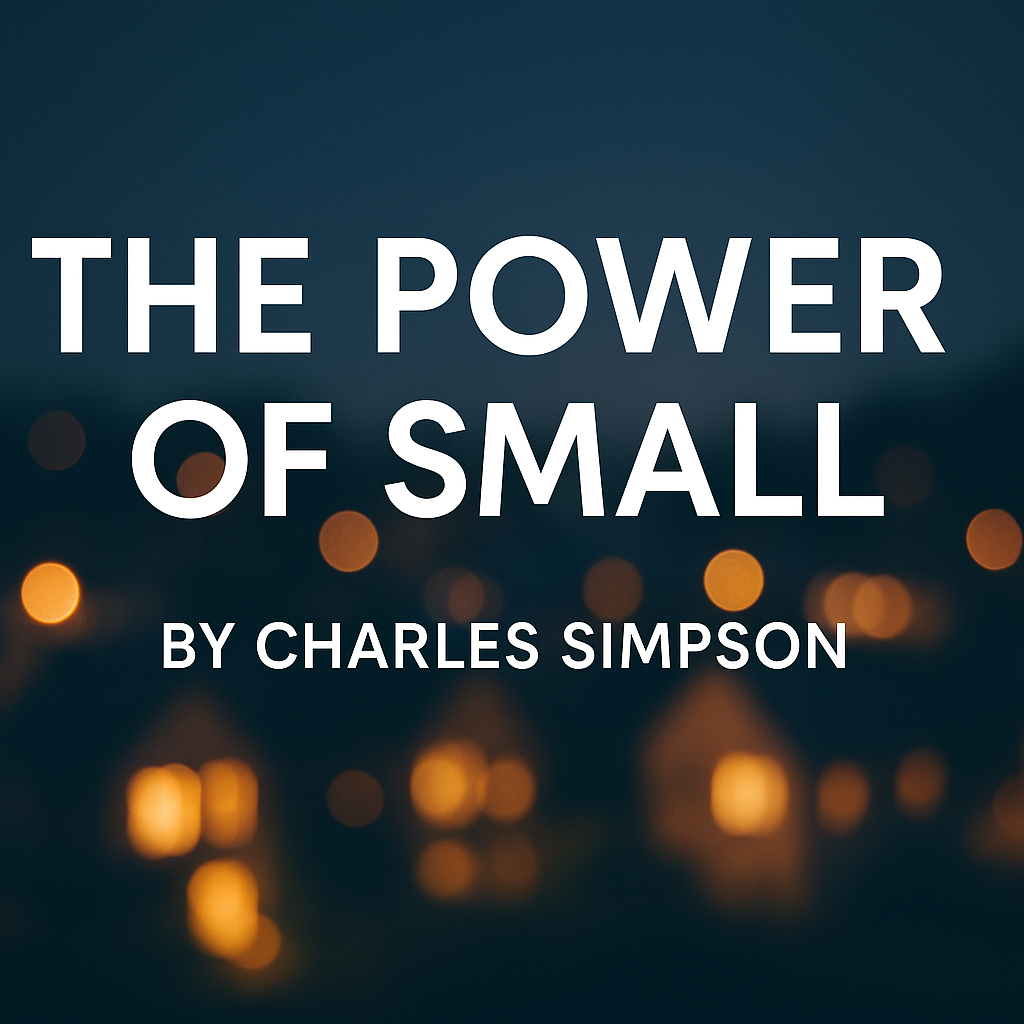Five Things We Will Learn
- Why God often restores through “small beginnings” rather than big platforms.
- How Jesus intentionally chose obscurity, humility, and ordinary people to change the world.
- What the early Church’s house-to-house pattern reveals about Kingdom life.
- How drift happens—from Kingdom fellowship to institutionalism—and how to return.
- Practical marks of “healthy cells” (small, relational groups) that host Jesus’ presence and advance His mission.
“Never despise the day of small beginnings. That’s where God starts restoring everything.”
Opening Gratitude and a Porter’s Parable
I’m grateful for God. Aren’t you grateful for the mercy, grace, and goodness of God? My father was a minister for over 60 years—a good man, a good father—and he pastored his last church for 35 years. As a Southern Baptist, that’s a real achievement by the grace of God. He loved to tell stories.
He told a story about a fellow who was heading east and passing through Chicago in the middle of the night. He needed to get up early for a very important business deal, so he gave the porter $20—which was a lot of money—and said, “I’ve got to get off in Chicago at the station. Whatever you do, don’t let me sleep.”
The next morning, the man woke up in Cleveland. Furious, he found the porter and scolded him harshly. A nearby fellow said, “Why did you put up with that?” The porter replied, “If you think he was mad, you should have seen the guy I threw off in Chicago.”
💡 “Sometimes doing your job well means not being understood—but still being faithful.”
Acts: Not Just Beliefs, but Action
The Book of Acts isn’t the Book of Beliefs or Theories—it’s the Book of Acts. It records what the Holy Spirit did through the apostles, not just what they thought or believed.
I’m grateful for any action or strategy that redeems people, institutions, and culture. Christianity was never meant to be theory alone—it’s Spirit-driven action that restores what’s broken.
The Power of Small vs. the Obsession with Large
Our culture celebrates big: big government, big business, big churches, big platforms. But God often starts with small.
🕊 “Not by might, nor by power, but by My Spirit, says the Lord.” — Zechariah 4:6
Zechariah saw visions of restoration—messy, difficult work that had to resemble the original design, not a remodel. God told him two crucial truths:
- “Not by might nor by power, but by My Spirit.”
- “Do not despise the day of small beginnings.”
Those two statements define the power of small: God’s greatest restorations always begin quietly—with small acts, small people, and small beginnings.
✨ “Restoration is never about remodeling—it’s about returning to God’s original design.”
Jesus: Not Only Good—Brilliant
Whatever anyone thinks about Jesus Christ, He is unique in all of history. He wasn’t only good—He was brilliant.
The enemy wants to separate goodness from intelligence—as if kind people can’t be wise, and wise people can’t be good. But Jesus was both.
Have you ever stopped to think about the mind you’re addressing when you pray? The One who spun galaxies into motion hears you. That realization should humble us deeply.
🌌 “When you tell God what to do, remember—you’re speaking to the mind that created 150 billion galaxies.”
Philippians 2 and the Shock of Obscurity
Jesus deliberately took the low road. Philippians 2 says He “made Himself of no reputation.” He didn’t lose reputation accidentally—He laid it down intentionally.
He chose:
- An obscure village.
- An obscure mother.
- An obscure trade.
- An obscure life.
And yet through that smallness, God shook the world.
💬 “He chose obscurity to reveal glory. He chose smallness to release greatness.”
Even His disciples—ordinary, diverse, flawed—were hand-picked to demonstrate what God can do through common people filled with uncommon grace.
Fellowship and the Crucified Concept
The disciples argued, misunderstood, and competed. Yet Jesus kept fellowshipping with them—house to house, meal to meal, heart to heart.
When the cross came, their ideas of greatness were crucified too. But resurrection followed. Small seeds die before they multiply.
🌱 “Every great move of God begins with a crucified concept and a resurrected reality.”
Cross, Pentecost, and a Surprising Preacher
Before the cross, they couldn’t agree. After the cross, they were in one accord. The cross burns away what divides us.
Then came Pentecost—flames, unity, power. And the first preacher was Peter—the same man who had denied Jesus with curses.
Fifty days earlier, disqualified. Fifty days later, leading revival.
That’s the power of grace, and it started with a handful of small, humbled people.
🔥 “When the Holy Spirit fills small people with great surrender, history shifts.”
Where Did They All Go? Back to the Houses
Five thousand new believers—where did they go? Not into cathedrals. Not into systems. Into homes.
They met house to house, eating, praying, praising, and sharing. “Church” meant any Kingdom citizens gathered around Jesus.
🏠 “Church began as family around a table, not as a crowd around a stage.”
This is our spiritual DNA. The power of small gatherings isn’t nostalgia—it’s God’s blueprint for discipleship.
Cornelius, “Nothing Doubting,” and Crossing Cultures
Peter’s leap from Simon’s house to Cornelius’ house crossed culture, race, and centuries of division. God said, “Go with them—nothing doubting.”
That’s faith at its purest: small obedience producing global impact.
The gospel leapt from Jew to Gentile through one man’s obedience in a single house meeting.
Healthy Cells, Healthy Body
By Acts 17, the world accused them: “These who have turned the world upside down have come here also.”
But before they turned the world upside down, they had to let God turn the church right side up.
Healthy churches begin with healthy cells—small gatherings where people know and love each other, where the Spirit moves freely, and where Jesus is the center.
⚙️ “The Kingdom spreads cell by cell, not celebrity by celebrity.”
How Drift Happens—and What to Restore
Over time, success brought drift:
- Outdoors → Indoors
- Homes → Temples
- Kingdom Gospel → Church Gospel
- Fellowship → Membership
- Persecuted → Persecuting
- Servant leadership → Hierarchical leadership
The Reformation helped, but we still stayed largely indoors. The Lord is calling us back—back to small, relational, Spirit-filled life.
“Your Kingdom Come”: When Burnout Meets Surrender
There was a time I was burned out—preached 25 times in five days, empty inside. In a prayer meeting, I began whispering the Lord’s Prayer:
“Our Father in heaven, hallowed be Your name. Your Kingdom come…”
And for the first time I realized—I was asking for it to happen in me, right there. The Kingdom isn’t only coming someday—it’s coming here and now.
🙏 “When you pray ‘Your Kingdom come,’ you’re inviting divine government into your own heart first.”
We sat in silence. The Spirit spoke without words. His presence filled the room. Small room. Big God.
Gideon’s Math and God’s Glory
God told Gideon, “You’ve got too many.” Thousands left—still too many. God reduced him to 300.
Why? Because small gets the glory right. If you win with a crowd, you get credit. If you win with 300, God gets glory.
🪔 “The power of small ensures that when victory comes, everyone knows it was God.”
The Prodigal Church and the Father’s House
Can the prodigal church come home? Yes—if she will remember, humble herself, become a servant, and stop worrying about her reputation.
When she does, the Father is waiting—with robe, ring, and shoes—the shoes of the gospel of peace.
The Church can come home. But she’ll have to start small again.
🕊 “Revival begins not in the sanctuary, but in the living room.”




